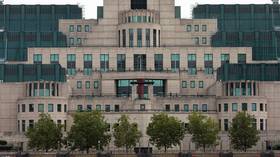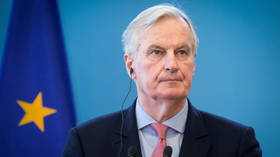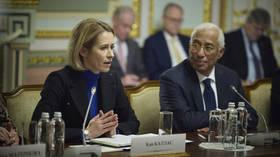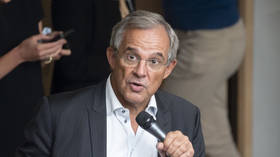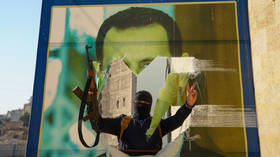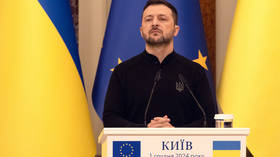‘Lies, lies and more lies’: Lawyer slams day 2 of Julian Assange’s US extradition hearing, here is how it went down
Day two of Julian Assange's US extradition hearing saw his lawyers argue he made great efforts to ensure his leaks endangered no lives and even warned the White House when media outlets were about to dump unredacted files.
The day began with a furore over WikiLeaks editor Kristinn Hrafnsson being kicked out of the courtroom’s public gallery without explanation. The drama was short-lived, however and proceedings soon got underway. During the confusion, former MEP Matthew Patten tweeted that there was a "strong rumour" that Downing Street made an "immediate call" to get him back in.
“I have demanded a written explanation of what occurred.”WikiLeaks editor-in-chief responds to being "not allowed into the public gallery" for Julian Assange’s extradition hearing before officials let him back in and apologised. pic.twitter.com/QifwHUopb9
— RT UK (@RTUKnews) February 25, 2020
Once again, protesters gathered outside the Woolwich Crown Court in support of Assange and could be heard inside the courtroom — something which Assange had said, while appreciated, made it hard to concentrate during Monday’s hearing.
Day 2 of Assange hearing begins - supporters chanting loudly again - will be giving regular updates #freejulianassange#DontExtraditeAssange
— NADIRA TUDOR (@nadiratudor) February 25, 2020
Assange ‘handcuffed and strip-searched’
As the hearing began, James Lewis QC, representing the US government, complained that the defense was receiving transcripts of court proceedings while the prosecution was not. Edward Fitzgerald QC, representing Assange, said the transcripts were privately made and they would share a copy if the prosecution paid half the costs.
Next, Fitzgerald told the court that on Monday, the first day of the US extradition hearing, Assange was handcuffed 11 times, stripped naked twice and placed in five different holding cells at Belmarsh Prison. He asked Judge Vanessa Baraitser to request that the prison treat Assange humanely. She said there was little she could do, but would expect that the WikiLeaks founder be treated in accordance with his human rights.
At one point, journalist Kevin Gosztola, who was present in the press annex, tweeted to complain that Lewis “won’t speak into the microphone” and that reporters “cannot hear a word.”
WikiLeaks ‘changed the world’
Defense lawyer Mark Summers told the court that the prosecution’s case was full of “lies, lies and more lies.” He told the judge that Assange’s alleged offenses in the US extradition request were false.
In particular, the defense argued that claims that Assange enabled fellow whistleblower Chelsea Manning to access databases of sensitive material were “provably wrong.” This relates to the massive cache of military material leaked to WikiLeaks by Manning in 2010, including the infamous footage of a US military helicopter killing 12 people, including two Reuters journalists.
Also on rt.com Day 1 of Assange’s US extradition hearing: What you need to knowSummers said that the evidence proves Manning already had access to classified material, while the prosecution claimed that Assange assisted Manning with a password hack. He also said the leaks were clearly in the public interest and proved that the US was spying on UN diplomats and engaging in extra-judicial killings. Making them public “changed the world,” he said.
Next, attention turned to WikiLeaks’ ‘most wanted’ list of leaks it had asked for people to submit to the site. Summers said the list did not mention anything about US diplomatic cables and dismissed the “fantasy” claim that Manning uploaded the cables after seeing a request for them on that list.
No reckless leaking
To counteract the claim that Assange had recklessly released the leaks and put lives at risk (one of the prosecution’s key arguments), the defense noted that Assange had partnered with major media organization to read and redact the cables, where necessary, before releasing them.
Also on rt.com ‘We should talk war crimes & killing civilians, not US espionage claims in this court’ – WikiLeaks head Kristinn HrafnssonHe said the US government was also involved in the redaction process and said a witness from German publication Der Spiegel will testify that it discussed redactions with the US State Department and that WikiLeaks took extreme measures to keep certain information secure.
Summers noted that the reason the cables ended up online in unredacted form was because two Guardian journalists, David Leigh and Luke Harding, published a secret password in their 2011 book on WikiLeaks.
The defense said that in 2011 Assange had even phoned the White House to warn them that the unredacted files were about to be published online and was told to call back later. “I don’t understand why you’re not seeing the urgency of this. Unless we do something, then people’s lives are at risk,” Assange said on the call, which was recorded in the documentary Risk by Laura Poitras.
Summers said the evidence does not support the US government claim that Assange was reckless in his leaking when he made every effort to protect sources.
‘Abuse of process’
Shortly before midday, the public gallery was closed off to journalists, causing some confusion among journalists. The court rose for a short time to deal with the issue, before resuming again.
After lunch, Summers told the court that he had broken his glasses during the break and might be a bit slower for the second half of the hearing.
The defense continued to argue that documents Manning leaked on Iraq were "non-sensitive,” would be of no use to an enemy and included no names. What's more, the defense claimed that Manning didn't require a username and passport to access the database where she obtained the Iraq and Afghanistan war logs, making the US government’s hacking charge false.
Also on rt.com ‘Oppression, arbitrary detention & torture will happen to journalists if extradition is successful’ – Assange's fatherTo bolster the argument that Manning did not require help from Assange to access classified documents, Summers said that members of Manning's army unit and even one of her superiors had asked her to crack admin passwords so they could instal video games and other programs on their computers.
Summers continued attempting to punch holes in the extradition request, saying it must be fair and accurate in its claims, but that in Assange’s case the US government was acting in bad faith and engaging in “abuse of process.”
‘Straw man arguments’
Lewis, prosecutor for the US, rose to respond at around 3:35pm. He accused Summers of employing the “kitchen sink method” in his defense.
He argued that since a US grand jury indicted Assange, there is a "clear unequivocal legal basis" for charging him and that Summers presented “straw man” arguments which were irrelevant.
He said WikiLeaks' general request for bulk classified documents from the public qualifies as the solicitation from Manning referred to in the extradition request. He argued that it was not the function of a British court to determine these "factual issues" anyway. He also referred to Manning's 2013 statement to court as the "self-serving statement" of a "co-conspirator" which cannot be relied upon.
Also on rt.com ‘History will be kind to Julian Assange, not to his corrupt accusers and Judges’ - Kim Dotcom on extradition trialAs Lewis spoke, Judge Baraitser paused proceedings to ask if Assange was feeling well enough to continue. Through another one of his lawyers Assange said he was struggling and having trouble concentrating.
Court adjourned shortly before 4pm and will resume at 10am on Wednesday when the 2003 UK-US extradition treaty will be examined.
Like this story? Share it with a friend!



